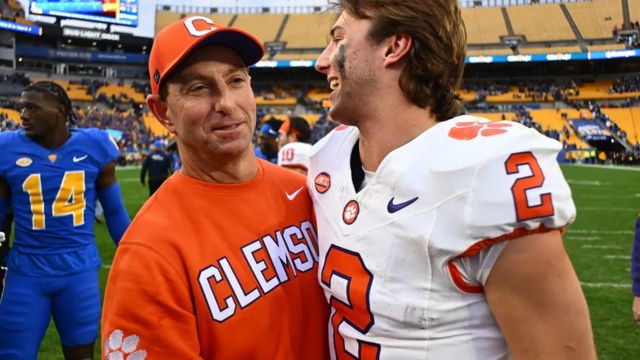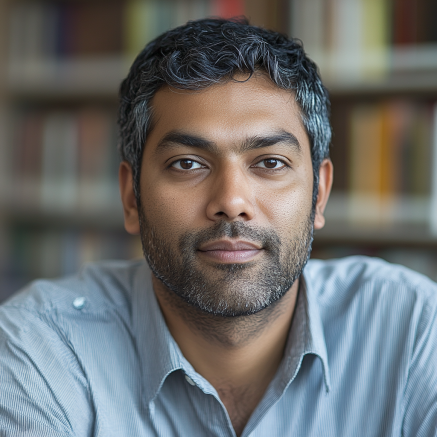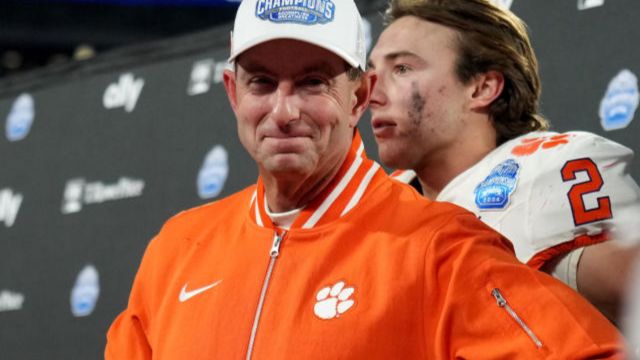The head coaches of the ACC football teams got together in a hotel conference room in Uptown Charlotte in July 2021, one day before ACC football media days, to hear a presentation.
Jack Swarbrick, who was the athletic director at Notre Dame at the time, stood in front of the group to discuss the new, expanded College Football Playoff. Over the course of more than an hour, Swarbrick talked about the 12-team structure, which starts for the first time this weekend.
After his talk, Swarbrick looked around the room and saw some worrisome looks.
It hurt them.
Most of the people who hate? Coach Dabo Swinney at Clemson.
At one point, Swarbrick says, “I had to tell them, ‘Look, guys, I’m just passing on the information.'”
After more than three years, just days before the start of the playoffs, Swinney and his Tigers are the ones who are benefiting from the new system that he criticized so harshly. Clemson won the ACC championship game and got the fifth and final automatic qualifier spot for conference winners. They were the 12th seed in the 12-team field.
But Swinney doesn’t feel bad about anything. He still believes what he said before: adding more playoffs is changing college football into something he didn’t want to see.
That’s what he told Yahoo Sports earlier this month: “It’s what I thought it would be.” “I liked the old way because I thought college football was different.” Now it’s the same as everything else. It’s the same as what pros do.
Of course, he has a point.
Even people who are very against expanding the playoffs have to admit that the new playoffs bring college football one step closer to being like its big brother. This is just one more step in the industry’s well-known march toward professionalism.
For example, in July, schools will be able to pay players directly. They will sign them to contracts, some of which include buyouts. A lot of these deals are made through managers. NFL coaches and front office staff are being hired by schools to work in this new, professional world.
Even worse, college football is starting to use rules from professional football. A two-minute warning was added to the sport this year.
Bill Belichick, the new coach of North Carolina, told Pat McAfee last week, “It seems like college football is more like pro football right now.”
The pro-like changes are having a big effect on the business world. There are different opinions on whether they are good or bad. But one thing is becoming clear: the game is fair for the first time in years, if not ever. This is another NFL tradition.
Is that equal? This is what coaches and managers think happens when players are free to move around.
That’s something that even Swinney thinks is true.
“What’s the most important football position?” The quarterback. “Anyone can go get a quarterback,” Swinney said. “These kids don’t sit down.” Or maybe the kids did really well and now they have the chance to move somewhere else, which is a good financial choice for them. It doesn’t take long to go from being a bad quarterback to a great one. That changes everything for many projects.
Five of the 12 teams in the playoffs have quarterbacks who are in their first season. Oregon is the top seed in the playoffs, and Dillon Gabriel is leading them there. Gabriel played for Oklahoma last year. Sam Leavitt, the quarterback for Arizona State, played college football at Michigan State.
Rank eighteenth This is Will Howard’s first game as a starter for Ohio State. Last year, he threw 24 touchdowns for Kansas State. Kurtis Rourke was Indiana’s quarterback last year. The last team is Notre Dame, which picked up Riley Leonard from Duke during the off-season.
That doesn’t take into account SMU, which may be the most important playoff team to benefit from the site.
The Mustangs are a great example of this new type of car. They got back-ups and role players from football powers of the past and put them in charge as stars.
As a four-star talent, Brashard Smith is the team’s best running back. He played receiver at Miami behind Hurricanes star Xavier Restrepo. Matthew Hibner, the starting tight end, played on the Michigan football team last year but didn’t start.
The whole defensive front for SMU is made up of major college transfers. Swinney calls it “the biggest D-line we’ve played this year.” Another one is from Arkansas, and the last two are from Miami.

“Those guys were not like the ones at their old school,” SMU coach Rhett Lashlee said. “Those schools didn’t want them to leave, but they could make a difference.”
He says that the big names in college football can no longer “load up, create a monopoly, and dominate over and over again” because of the new transfer rules. Players can now go to any school they want. Before, they could only go to one and were punished for moving. They are dropping out of school to start new jobs that may pay more.
“They move so they can play, and it makes the talent more spread out,” Lashlee said.
It’s kind of like NFL free agency, right?
Unless, of course, you are in college, where there are no jobs, no group bargaining, and no contracts that can be enforced. These might be the main ways in which the two are still different.
“They didn’t have as many people working there when Lashlee got there,” Swinney said. “He won’t have time to build it by recruiting in high school.” Now you have the power to go get guys.
The way SMU has put together its team to try to make the playoffs is similar to how other teams have done it. Curt Cignetti, Indiana’s first-year coach, mostly put together a team of Group of Five level graduates, with many coming from his old school, James Madison.

Joann Hinds has been covering U.S. local news for three years, bringing stories that matter to life with accuracy and heart. Known for his keen eye for detail and a passion for community-focused reporting, Joann is dedicated to highlighting the people and events shaping everyday lives. His work reflects a deep commitment to honest and impactful journalism.

